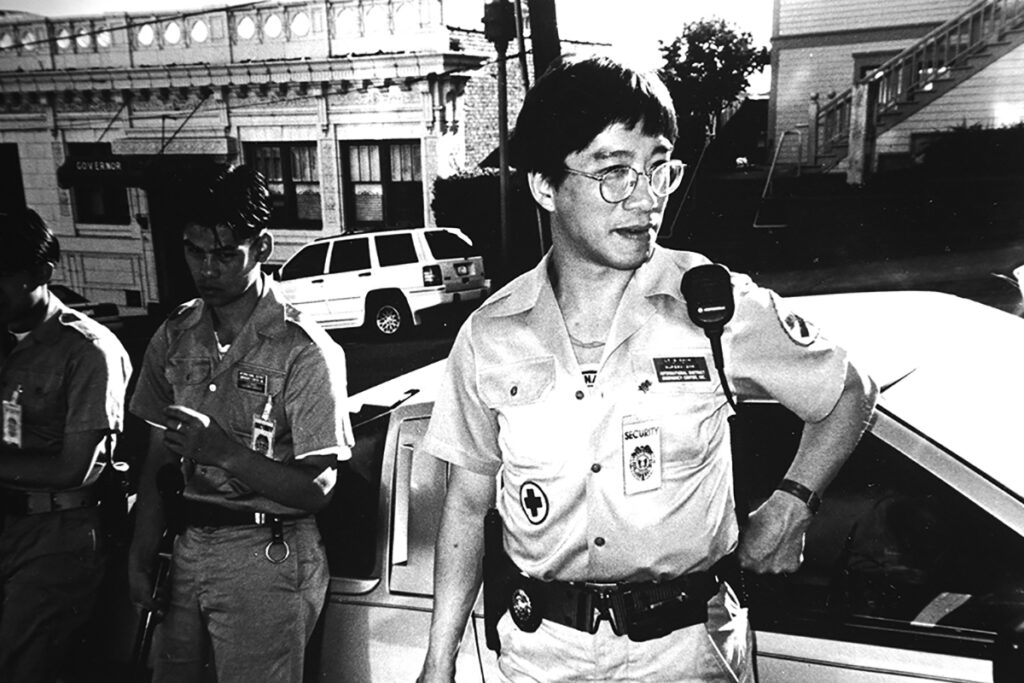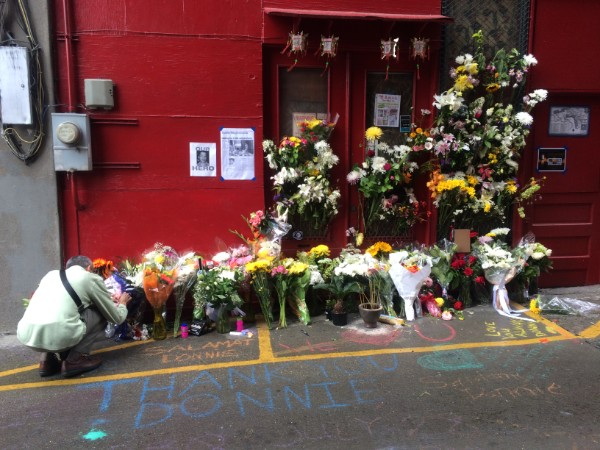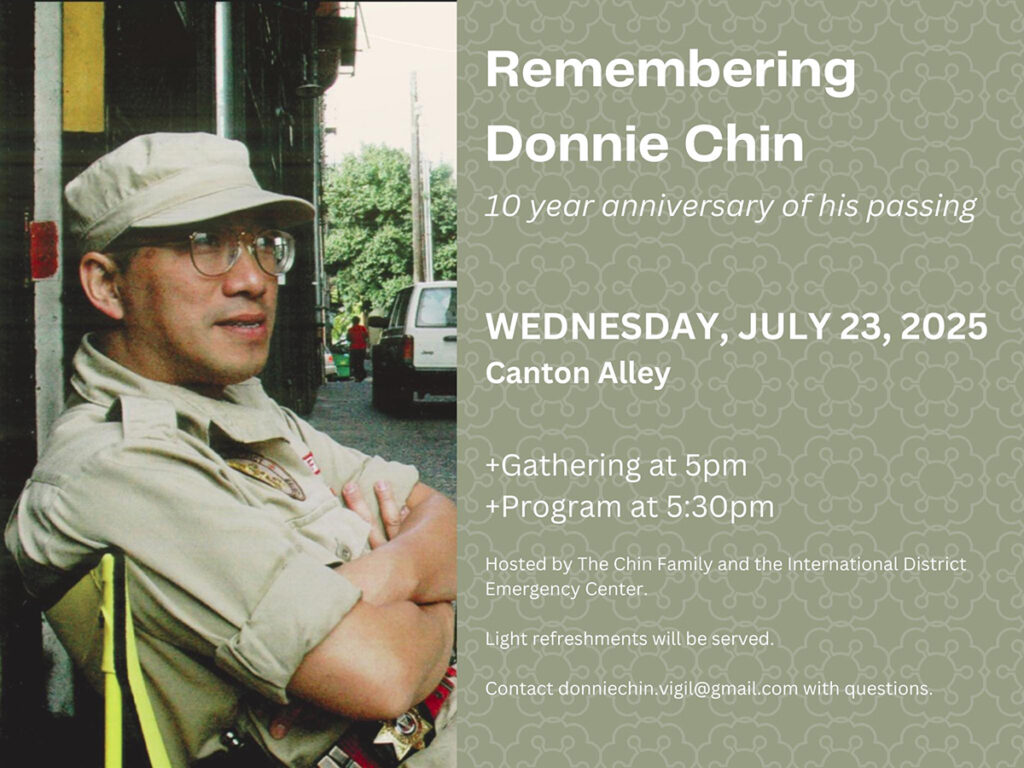By Carolyn Bick
NORTHWEST ASIAN WEEKLY
Editor’s Note: This is the second story in a three-part series marking 10 years since the death of Donnie Chin. Through the voices of those who knew him, this series explores his life, impact, and the legacy he left behind.
See part 1 here.
Ten years have passed since Donnie Chin—Chinatown-International District (CID) activist and longtime leader of the International District Emergency Center (IDEC)—was killed while on patrol in his own community.
In this second installment, the Northwest Asian Weekly interviewed Eugene Lee, a retired police officer, who first met Donnie in 2006. Lee remembers the pair immediately clicking—“like brothers,” he said. But even though Donnie presented as hard and cooler on the outside, Lee often also saw the soft, gentler side of the man who so loved his community.
Eugene Lee
I met Donnie somewhere around 2006, 2005. I met him through Bernie [Kay]. We were in a ski patrol refresher, a first aid refresher, and Bernie introduced me to Donnie.
Donnie’s a little wary of other people. And he felt me out, and I could sense that. But after a bit, volunteering with him and watching him and him watching me, boy, we became like brothers, almost.
I had the biggest respect for him, especially his ability to get into a situation and de-escalate it. To me, he was a great person.

Donnie Chin (Photo provided by Dean Wong)
Donnie, when you first meet him, he’s dressed in his khakis like a Boy Scout. But then after you talk to him a little bit, his language is not that of a Boy Scout by any stretch of the imagination. It’s very colorful. It was cool.
In my background, that’s basically what I did for a living, too, was size people up. I was in law enforcement, so, yeah, we sized people up. And that’s what [Donnie] was really good at. It was something he was born with, and he spent a lifetime on the streets of Chinatown. That was him, interacting with everybody in the village.
I’m 81. He’d be 70 this year.
I don’t live in Chinatown, but if I was there, [I would be] hanging around with him [as part of IDEC]. At events, you’ve got time to talk and interact with the people you’re volunteering with, and you get to know them and they get to know you.
[I worked with IDEC at the first aid station and] sometimes provide security for events.Everybody in IDEC was there because that’s what they wanted to do—give back to the community, to a person. Nobody was there for the money. Nobody was there for the fame and glory. That wasn’t a part of it. It was just a group of people led by Donnie who were there to give back, and that’s what they wanted to do.
Law enforcement was close to that, in as much as nobody went into law enforcement for the money. But it was a paid position, too. It’s what you did for a living. Nobody did IDEC for a living.
I didn’t grow up in this kind of town. It was really an eye-opener to just hang around with Donnie in Chinatown, and he knew everybody. I’m from New York, and I had New York-Chinatown roots, and knew a lot of people there, but not to the extent of what Donnie knew.
There’s more similarities than differences [between here and New York]. Streets in New York-Chinatown were narrow, dirtier. Seattle’s Chinatown streets are quite wide, even by Seattle standards. But there’s so many more similarities, like being raised in a village. If you do something wrong, they’ll tell your parents. Accountability, that kind of thing. But it’s an experience.
Donnie was his own man. He went against the grain. I mean, there’s no doubt about it.
And it manifested in that aspect of his life. He was offered a tryout position for the fire department and the police departments here and chose not to. He chose to remain with the community instead where he felt he could contribute more.
He was a great human being. He was a great person. His exterior demeanor was tough as nails. But that’s Donnie—one time, it was a Chinatown parade event, and I had plantar fasciitis on my heel, and I was having trouble getting around. Donnie found me places to sit or a chair or something, and we did what we had to do.
He had a political view. At the end of [a] parade [in Chinatown], the Chinese drill team would line up, and give this ceremonial bow to the people finishing the parade. And Donnie and I counted how many times they bowed to the PRC (People’s Republic of China) representative, and counted how many times they bowed to the ROC (Republic of China) representative. And I thought that was pretty cool.
They gave more bows to the ROC.
When you’re with a person, when you spend time with them, you just get to know them. His language was salty, and he was kind of like me, too. He just would say things to set you off, you might say. On purpose. Like he’s playing games with you. That’s because he came from the streets. A wise guy from the streets.
But he was not that tough—soft on the inside. Because he was compassionate. It was a compassionate endeavor, IDEC. It’s all about helping.

Flowers in honor of Donnie Chin were placed front of Sun May at Canton Alley in July 2015 (Photo by Assunta Ng)
No status update on murder investigation
I don’t know why it’s taken so long [to solve his murder]. I know the Seattle Police Department has had abrupt changes of leadership. I don’t know if that contributed to it at all or not.
I do know that I’ve seen Carmen Best and Adrian [Diaz] show up at the community events. But I don’t know why. I know the police department at the ground level was solidly behind Donnie. I just don’t know why. I assume they have a plan.
I hope that this thing gets solved and resolved. I hope.
It’s commonly assumed that he was caught in a crossfire, or at least this is what they’ve put out.
I’m sure they left no stone unturned. In the movies, they get a big break.

